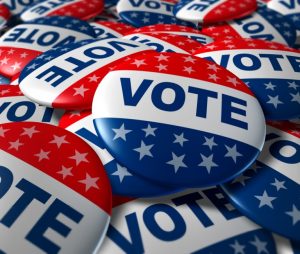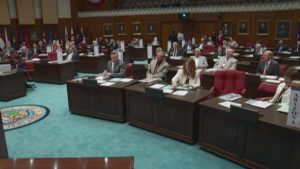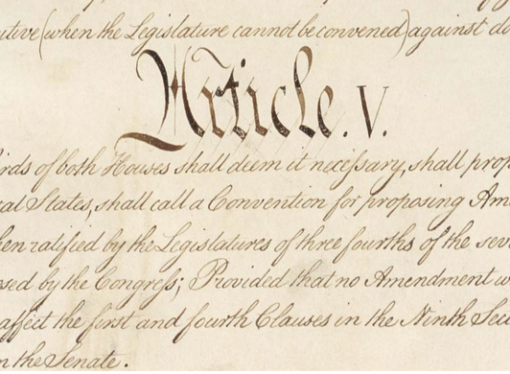Establishing Uniform, Nationwide Voting Rules For National Elections
by Paul S. Gardiner – November 29, 2020
Millions of Americans believe that uniform, nationwide rules soon need to be established for voting in national elections. As described herein, state legislatures have a vital constitutional role to play in establishing these rules. This article offers a strategy to establish these rules prior to the 2024 national elections.
It is believed that there are only two options available to achieve nationwide, uniform voting rules for national elections:
1) The first option is for state legislatures in all 50 states to voluntarily agree on uniform rules for voting in national elections. Realistically, this option has a low probability of succeeding given the differing viewpoints on election matters such as early voting where state legislatures allow different time periods for citizens to cast ballots, etc. Further, from time to time state legislators in one state (or several states) may decide to modify a particular voting rule or procedure irrespective of other states’ voting rules. Simply put, expecting 50 different state legislatures (republican or democrat controlled) to voluntarily agree on much of anything is most likely “a bridge too far”.
2) The second option to achieve nationwide, uniform national election voting rules is to secure an amendment to the United States Constitution, applicable in all 50 states, that specifies such rules. Many people feel that such an amendment is direly needed, but the question arises of how to secure such an amendment and further, how can this be achieved prior to the 2024 national elections?
A constitutional amendment typically is proposed by members of the United States Congress. The proposed amendment is then sent around to the legislatures in the 50 states for ratification by at least 38 legislatures; only after successful ratification does an amendment become part of the constitution and law of the land. Given today’s adversarial political environment in congress and its frequent inability to accomplish much of anything, trying to get a constitutional voting amendment proposed and agreed to by members of both the House and Senate is very unlikely.
However, inherent in the second option to secure a constitutional amendment is the power and authority granted to state legislatures in Article V of the constitution. Many Americans understand that when at least two-thirds of the state legislatures (34 legislatures) agree that an amendment or amendments are needed, they can apply to the congress to call for a convention of states to propose amendments. Upon receipt of at least 34 state applications/resolutions, Article V states that the congress “—Shall call a Convention for proposing Amendments—.” Members of congress have no choice in the matter; they are constitutionally required to call for a convention of states to propose amendments. An amendment proposed by a convention of state legislatures has the same ratification requirement as amendments proposed by the congress. For one reason or another, there has never been an Article V convention of states to propose constitutional amendments.
The above fact notwithstanding, this article argues that such a convention is now a necessity and essential first step to establish nationwide, uniform rules governing voting in national elections.

Requirements and limitations that might be included in an amendment governing voting in national elections are as follows:
1) In order to be counted as a legal ballot, all ballots must be cast and received by close of business on election day;
2) Absentee ballots, requested by registered voters, are the only mail-in ballots allowed;
3) With the exception of absentee ballots, all voting must be accomplished in person at prescribed polling stations;
4) A government-issued, photo identification card is required in order to vote; and
5) Early in-person voting is allowed at prescribed polling stations up to 14 days prior to election day.
The question arises: what is the probability of 34 state legislatures applying to the congress to call/sanction a convention of states to propose the above amendment? To answer the question, a brief discussion of recent efforts to conduct a convention of states follows.
In recent years, there have been at least four citizen grassroots Article V organizations striving to have state legislators apply to the congress to call for a convention of states to propose one or more amendments. To date, there has been little, if any, cooperation among the four primary organizations attempting to reach the required threshold of 34 state legislature applications. As described below, the effort overall has slowed to such an extent that realistically, the current disjointed strategy to hold a convention stands little chance of succeeding.
In his January 2020 The Article V Convention Legislative Progress Report, Georgia Attorney David F. Guldenschuh states that “The last half of the past decade saw the Article V movement peak, but the last two years have seen a plateauing of our efforts. We are now down to four major groups: the Center for State-led National Debt Solutions (CSNDS; the 501(c)(3) arm of the BBA Task Force); U.S. Term Limits; WolfPAC/Free & Fair Elections; and the Convention of States Project.”
One of the major takeaways from the above report is that years 2018 and 2019 experienced a “plateauing” of effort by the various Article V groups in securing the required 34 state applications. The same can be said about year 2020.
Having said the above, following is a new strategy to have a convention of states held as soon as possible but well prior to the 2024 national elections. As explained below, only through the use of aggregated, existing and qualifying state applications/resolutions for a convention will it be possible hopefully in the near term to require the congress to call for a convention of states.
The new strategy envisions use and implementation of the results of a 250-hour research effort by attorney John M. Cogswell who in 2018, concluded that there are in excess of 34 existing, qualifying state applications to congress, each applying for a convention of states to propose one or more amendments. A report of Cogswell’s findings can be found in the General Comments, Newsletter – Edition 72, January 2019, Providing Article V / Federalism News and Scholarly Resources Since 2013 – State Legislators Article V Caucus Feature Article: An Interview with Attorney John Cogswell On Why Enough Article V Applications Already Exist to Justify the Calling of an Article V Convention.
The above report states, “John M. Cogswell is not a widely recognized name within the Article V movement. The 79-year-old Cogswell is an attorney living in Buena Vista, Colorado. He is a graduate of Yale University and Georgetown Law Center, who has appeared before the US Court of Appeals for the District of Columbia, US District Courts in Colorado, Kansas and the District of Columbia, and the Supreme Courts of Colorado and Kansas.”
“During this past year, at the request of the new American Constitution Foundation (ACF), Cogswell invested more than 250 hours reading and carefully studying state applications for a convention to propose amendments as listed by the Article V Library (a feat very few other legal minds have attempted).”

“He also studied the extensive research and writings of respected constitutional scholars Michael Stokes Paulsen and Robert G. Natelson… and related works by James Kenneth Rogers, Charles L. Black, Jr., Thomas M. Durbin, David C. Huckabee, and Yale constitutional law professor Akhil Amar.”
“Cogswell recently issued his legal opinion that a willing Congress could easily find sufficient state applications to justify an immediate Call for a convention of states under the terms of Article V. His 39-page (plus numerous pages of appendix documentation) opinion is not exactly bedtime reading, but should be read and studied by every state legislator, Article V activist, and member of Congress.”
In conclusion, the major arguments presented in this article can be summarized as follows:
1) America urgently needs nationwide, uniform rules governing voting in national elections;
2) The most likely, realistic way to achieve the above rules is via a constitutional amendment applying to citizens and election boards/officials living in all 50 states;
3) The most feasible way to propose the above amendment is via an Article V convention of states required to be called by the congress once it receives at least 34 qualifying state applications for such a convention;
4) Additional, highly desired amendments could be proposed at the convention such as (a) establishing term limits (total years served) for members of congress; (b) limiting the United States Supreme Court to nine justices; and (c) prohibiting the dissolving of the Electoral College;
5) A convention of states is a necessary first step to ultimately establish nationwide, uniform rules governing national elections;
6) Legal action may be required to force an unwilling congress to perform its constitutional duty to call for a convention of states;
7) A highly creditable research study indicates that there are at least 34 existing, qualifying state legislature applications presented to congress to require the members to call for a convention of states; and
8) One or more of the existing Article V grassroots organizations (or an entirely new entrant) needs to verify the contents of this article; then secure the necessary funding to support working with state legislators and grassroots supporters in at least 34 states to make a convention of states occur as soon as possible; thereafter, provide adequate funding and other resources to support nationwide ratification efforts.
Paul S. Gardiner served as Georgia Coalitions Director and National Veterans Coalitions Director for the Article V COS Project organization. He is a retired Army officer, Vietnam veteran, and avid lover of America. He is a graduate of the University of North Carolina at Chapel Hill, the University of Alabama, and the United States Army War College.

